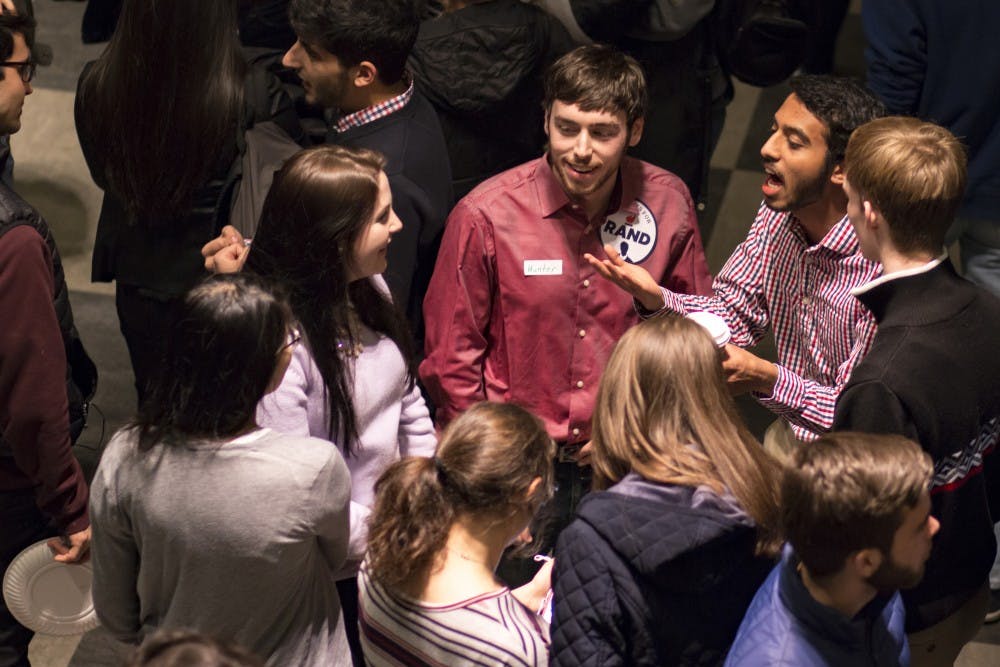Once the votes were counted in the Iowa caucus, Sen. Ted Cruz (R-Texas) had claimed a solid victory. At the Penn Caucuses, hosted on Tuesday night by the Government & Politics Association along with six student candidate support groups, Cruz received not a single vote.
Ohio Gov. John Kasich, who only amassed 2 percent of the vote in Iowa, earned the support of over 50 percent of the Republican caucusgoers at Penn.
The event, held for the first time this year, included a familiar victor on the Democratic side in former Secretary of State Hillary Clinton, though with a much larger margin of victory than she attained in Iowa.
At Houston Hall, about 70 student attendees listened to stump speeches, dispersed to discuss the candidates amongst each other and rushed to huddle together under the sign of the presidential candidate they supported.
View post on imgur.com
When conversing in the Hall of Flags, students voiced the issues and concerns they had with each candidate. Skeptics of Sen. Bernie Sanders (I-Vt.) questioned his proposed tax policy while supporters of Sen. Rand Paul (R-Ky.) advocated in favor of the candidate’s proposal to audit the Federal Reserve.
Some student voters were swayed by their peers’ convincing arguments while others stubbornly defended their preferred candidates. Per traditional caucus rules, the time limit for discussions was limited by officials. Political civility reigned throughout.
The results, while not surprising for a generally liberal school like Penn, vastly differed from their Iowan counterpart.
Iowa GOP winner Cruz garnered zero votes while 1968 Wharton graduate Donald Trump finished fourth with just three student votes. Paul, who received a mere 5 percent of the Republican vote in Iowa, achieved a surprising second place with 13 student votes.
The only resemblance to the actual Iowa results was when Sen. Marco Rubio (R-Fla.) retained his third-place spot, earning 10 student votes on Tuesday night.
On the Democratic side, Sanders earned 19 student votes, placing him far behind Clinton, who only eked out a win against him in Iowa earlier Tuesday afternoon after pundits declared a virtual tie between the candidates on Monday night.
A comparison between Iowa’s voter demographics and the Penn student body can help shed light on the differing results.
Iowa’s voting population — mostly white, conservative and Christian — in part explains Cruz’s success in appealing to the GOP base and amassing 28 percent of the vote there. Trump’s incendiary rhetoric was only good enough for 24 percent of the Republican vote and barely held off a soaring Rubio who managed to garner 23 percent of the vote.
Penn students — younger and generally more liberal— saw more appeal in Kasich, the moderate Ohioan who tumbled to eighth place in Iowa.
“Kasich is not a crazy right-wing nutjob. Ohio has seen proven results: job growth during the recession,” Penn for Kasich Chairman and College junior Joe Kiernan said.
There were no student speakers, or votes for that matter, for Sen. Cruz or Christian conservative Ben Carson at the Penn Caucuses.
At Penn, Sanders was not greeted with the same kind of support from younger voters that the Vermont senator received in Iowa, where he won 70 percent of voters aged 17-29. Clinton supporters at the Penn Caucuses were set on convincing the undecided student voters.
“We need a president who can protect and build upon President Obama’s legacy,” Executive Vice President of Penn for Hillary and College senior Robert Klein said in his stump speech.
GPA organized the event in collaboration with Penn for Hillary, Penn Students for Bernie, Penn for Kasich, Penn for Jeb, Students for Rubio and Penn for Rand.
College junior and GPA President Sarah Simon said the event was organized to increase Penn students’ awareness of politics, meet new people through political discussion and create awareness for lesser-known candidates.
“I think we hear a lot on campus about Hillary Clinton and Bernie Sanders,” Simon said. “I think there are a lot of Republican candidates who people might be interested in voting for, but might not know about. Republican candidates are beyond the typical Trump you hear in the news media.”
Simon pointed out how GPA — a three-year-old Penn student group — is the largest, non-partisan political group on campus with the goal of creating a conversation with diverse political perspectives. The Penn Caucuses was part of that conversation.
“I would say that Penn students have gotten more political over the last few years,” Simon said.
“We have a great Political Science Department, but there has been a great proliferation of political groups on campus in recent years,” she added. “We’re one of them.”



